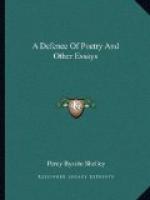We are intuitively conscious of our own existence, and of that connexion in the train of our successive ideas, which we term our identity. We are conscious also of the existence of other minds; but not intuitively. Our evidence, with respect to the existence of other minds, is founded upon a very complicated relation of ideas, which it is foreign to the purpose of this treatise to anatomize. The basis of this relation is, undoubtedly, a periodical recurrence of masses of ideas, which our voluntary determinations have, in one peculiar direction, no power to circumscribe or to arrest, and against the recurrence of which they can only imperfectly provide. The irresistible laws of thought constrain us to believe that the precise limits of our actual ideas are not the actual limits of possible ideas; the law, according to which these deductions are drawn, is called analogy; and this is the foundation of all our inferences, from one idea to another, inasmuch as they resemble each other.
We see trees, houses, fields, living beings in our own shape, and in shapes more or less analogous to our own. These are perpetually changing the mode of their existence relatively to us. To express the varieties of these modes, we say, we move, they move; and as this motion is continual, though not uniform, we express our conception of the diversities of its course by—it has been, it is, it shall be. These diversities are events or objects, and are essential, considered relatively to human identity, for the existence of the human mind. For if the inequalities, produced by what has been termed the operations of the external universe, were levelled by the perception of our being, uniting and filling up their interstices, motion and mensuration, and time, and space; the elements of the human mind being thus abstracted, sensation and imagination cease. Mind cannot be considered pure.
II—what metaphysics are. Errors in the usual methods of considering them
We do not attend sufficiently to what passes within ourselves. We combine words, combined a thousand times before. In our minds we assume entire opinions; and in the expression of those opinions, entire phrases, when we would philosophize. Our whole style of expression and sentiment is infected with the tritest plagiarisms. Our words are dead, our thoughts are cold and borrowed.
Let us contemplate facts; let us, in the great study of ourselves, resolutely compel the mind to a rigid consideration of itself. We are not content with conjecture, and inductions, and syllogisms, in sciences regarding external objects. As in these, let us also, in considering the phenomena of mind, severely collect those facts which cannot be disputed. Metaphysics will thus possess this conspicuous advantage over every other science, that each student, by attentively referring to his own mind, may ascertain the authorities upon which any assertions regarding it are supported. There can thus be no deception, we ourselves being the depositaries of the evidence of the subject which we consider.




